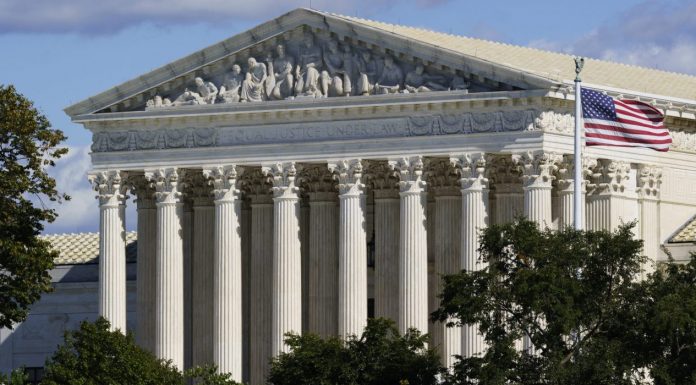(Headline USA) The Supreme Court is allowing the Texas law that bans most abortions to remain in place, but has agreed to hear arguments in the case in early November.
The justices said Friday they will decide whether the federal government has the right to sue over the law.
Answering that question will help determine whether the law should be blocked while legal challenges continue.
The court is moving at an unusually fast pace that suggests it plans to make a decision quickly. Arguments are set for Nov. 1.
The court’s action leaves in place for the time being a law that clinics say has led to an 80% reduction in abortions in the nation’s second-largest state.
The justices said in their order that they were deferring action on a request from the Justice Department to put the law on hold.
Justice Sonia Sotomayor, the farthest left member of the current bench, wrote that she would have blocked the law now.
“The promise of future adjudication offers cold comfort, however, for Texas women seeking abortion care, who are entitled to relief now,” the Obama-appointed Sotomayor wrote.
The law has been in effect since September, aside from a district court-ordered pause that lasted just 48 hours.
It bans abortions once cardiac activity is detected, usually around six weeks.
That’s well before the Supreme Court’s past abortion decisions have allowed states to prohibit abortion, although the court has agreed to hear an appeal from Mississippi asking it to overrule those decisions, in Roe v. Wade and Planned Parenthood v. Casey.
Past efforts to challenge those so-called super-precedents—which opponents argue should never have been established in the first place—have been thwarted by left-wing activist judges.
However, the Texas law was cleverly written to evade early federal court review by putting enforcement of it into the hands of private citizens, rather than state officials.
The focus of the high court arguments will not be on the abortion ban, but whether the Justice Department can sue and obtain a court order that effectively prevents the law from being enforced, the Supreme Court said in its brief order.
If the law stays in effect, “no decision of this Court is safe. States need not comply with, or even challenge, precedents with which they disagree. They may simply outlaw the exercise of whatever rights they disfavor,” the Biden administration wrote in a brief filed earlier in the day.
Ironically, Biden himself employed a similar tactic earlier in the year by ignoring a Supreme Court ruling that he disfavored, that would have required him to honor the expiration of a pandemic-related eviction moratorium.
“Texas should not obtain a different result simply by pairing its unconstitutional law with an unprecedented enforcement scheme designed to evade the traditional mechanisms for judicial review,” the administration wrote.
A day earlier, the state urged the court to leave the law in place, saying the federal government lacked the authority to file its lawsuit challenging the Texas ban.
The Justice Department filed suit over the law after the Supreme Court rejected an earlier effort by abortion providers to put the measure on hold temporarily.
In early October, U.S. District Judge Robert Pitman ruled for the administration, putting the law on hold and allowing abortions to resume.
Two days later, a three-judge panel of the 5th U.S. Circuit Court of Appeals put the law back into effect.
The court already is hearing arguments on Dec. 1 in the Mississippi case in which that state is calling for the court to overrule the Roe and Casey decisions.
Adapted from reporting by the Associated Press

